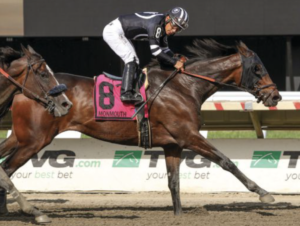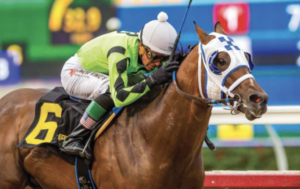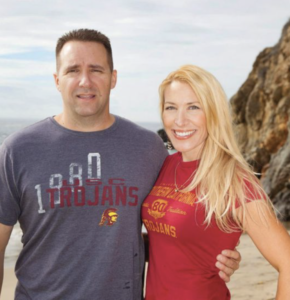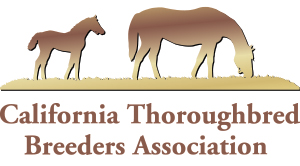Jeff Ganje learned his winning moves early in life. How many other horse breeders can say they had the iconic hip-hop star MC Hammer’s backup dancers practicing their choreography in his living room? Bet U can’t touch that.
True story: While Ganje was attending Cal State Hayward, where he played football and ran track in the early 1990s, his teammate and roommate Alonzo Carter was part of the Hammer dance troupe that used their place to practice.
Ganje was caught up in the excitement as well, tagging along with Hammer — who enjoyed success in racing for a time with his Oaktown Stable — throughout the rapper’s “U Can’t Touch This” tour. Ganje even entertained the thought of a musical career himself, rapping on a demo recording for Hammer before abandoning the idea.
“I didn’t really have the talent,” he says.

Shotgun Hottie in Molly Pitcher becomes Ganje’s frst graded winner
These days, the fast footwork that Ganje appreciates most are from the horses he owns, like the recent graded stakes winner Shotgun Hottie and the 2-year-old California-bred juvenile Lord Prancealot, winner of Del Mar’s Graduation Stakes in August. His favorite “hammer time” nowadays comes from the horse auctioneer’s podium.
It has been a long journey in racing for Ganje. After getting into horse ownership in the mid-1990s, he left the sport for several years, then returned with success after making the decision in early 2019 to devote himself full time to the game he loves.
Shotgun Hottie, owned in partnership with Omar Aldabbagh, became his first graded stakes winner when she upset the $500,000 Molly Pitcher Stakes (G3) at Monmouth Park in July. It was her second stakes win in a row for trainer Cherie DeVaux. Ganje purchased the Kentucky-bred daughter of Gun Runner for $45,000 at the Ocala Breeders’ Sales Company spring sale of 2-year-olds in 2021, and the bay filly has earned more than $770,000 to date.
Shotgun Hottie is currently turned out in anticipation of a 2024 campaign that is expected to begin with the Azeri Stakes (G2) and Apple Blossom Handicap (G1) at Oaklawn Park this spring. Ganje, who has ambitious hopes for her, calls Shotgun Hottie “my retirement plan, or more like my ‘get-back-some-of-my money’ plan,” he jokes.
Gun Runner also figured prominently in Ganje’s best sale so far. He purchased California-bred Super Patriot, a graded stakes-placed daughter of Unusual Heat, for $60,000 at the Keeneland November 2020 breeding stock sale. A year later, he sold the then 6-year-old mare in foal to the red-hot sire at the same sale for $300,000 through Checkmate Thoroughbreds.
“Timing was everything,” Ganje said. “I’m going to be honest with you, (the results) don’t usually work out like that. I mean, you can do all the work, do all the studying, that you can. But at the end of the day, sometimes it’s just about being lucky.”

Homebred Lord Prancealot aces Graduation Stakes at Del Mar
He’s also excited by the potential of his homebred Lord Prancealot, a California colt by the Irish-bred Sir Prancealot out of a French-bred mare, Disko Dasko, bought in foal for $10,000 at the Keeneland January mixed sale in 2021. Trained by Brian Koriner and co-owned by Rusty Brown, Lord Prancealot won his first two starts, including the Graduation Stakes at Del Mar Aug. 11, before fading to fifth in the I’m Smokin Stakes a month later.
The sprint specialist has earned more than $125,000, and he’s never even been on the grass, where his future lies, Ganje believes. He’ll get that chance later this year.
“I like to race 2-year-olds,” Ganje said. “Those are my favorites because you never know. To me, a 2-year-old brings hope.”
Ganje had a number of other prosperous pinhooks recently. He credits consignor Adrian Gonzalez at Checkmate for his success at the sales, as well as his yearling trainer, Monte Schvaneveldt.
Now 54, Ganje has always danced to a different beat. Even before getting into racehorse ownership while in his mid-20s, he was buying injured Thoroughbreds, mostly off the track from Golden Gate Fields and Bay Meadows, caring for them at a farm while they were being repurposed for other equestrian pursuits, then reselling them.
“I’d buy horses that were too injured to continue racing but were okay otherwise, and I’d usually pay $500 to $1,500,” he said. “I set up their training for other things like hunting, jumping, and dressage. Once they were ready, I’d sell them for $4,000 or $5,000. I was making pretty good money. Once I got three horses from a trainer for $1,500 and I sold them for about $12,000.” Chuckling, he added, “I thought I was rich. I was thinking, ‘I’ll never have to do anything else.’
“It was a good entry into racing, though — I learned a lot about horses,” Ganje added, things he says he never forgets when making decisions about his own horses.

Jeff and Abigail Ganje live in Laguna Niguel and have two daughters
Born in Fremont, Ganje lived in the Bay Area until he relocated to Southern California in 2005 to attend USC while earning a master’s degree in public administration, planning, and development. His business background is in real estate investment and development of residential and business properties. He and his wife, Abigail, live in Laguna Niguel in Orange County and have two daughters, Mackenzie, 19, and Gigi, 17.
He formed a partnership group, Texacali Racing, one of the first to use the Internet to attract clients, in the mid-1990s. That lasted a few years, but in spite of some early stakes success with trainer Jeff Bonde, Ganje was forced to drop out.
He returned to racing in 2011 on a limited basis before he came to a crossroads shortly before the pandemic struck. He had decided to “retire” from his real estate development firm, Southland Pacific Properties, in 2019, and was weighing his options.
“I was considering opening a restaurant or a gym, and it’s a good thing I didn’t do that,” he said. “So racing became my sole focus. Racing and breeding horses are the only things I’ve ever wanted to do.”
Jeff Ganje Inc. grew quickly — a little too quickly, he says. About 18 months ago, Ganje owned all or part of about 40 horses, and his training bills alone were reaching $130,000 a month.
“It was brutal,” he said. “Now I’m down to about 20 horses. I think I’d be happiest with about 12.”


